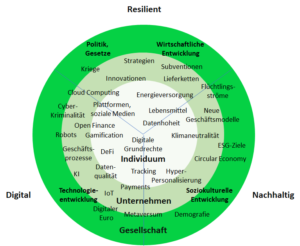Die Digitalisierung ist für uns alle – egal ob beruflich oder privat – allgegenwärtig. Die Vernetzung von Privatpersonen, Unternehmen, Branchen, Politik und Gesellschaft nimmt immer mehr zu. Daten, Analytik und Technologien spielen daher eine immer größere Rolle. Entsteht gerade die digitale Gesellschaft, die „Digital Society“? Oder handelt es sich um ein Schlagwort, das demnächst wieder verschwindet?
Sicherlich spielen Technologien wie Künstliche Intelligenz (KI), Blockchain, Cloud Computing und möglicherweise das Metaversum eine große Rolle dabei, wie wir unser Arbeits- und Privatleben zukünftig gestalten. Damit stellt die Digitalisierung den ersten großen Entwicklungsstrang dar. Ein zweiter Entwicklungsstrang ist jedoch die Transformation zur Nachhaltigkeit in Wirtschaft und Lebensweise. Die Dekarbonisierung unserer Welt ist vermutlich die größte Herausforderung, vor der wir stehen. Die Erfüllung der ESG-Kriterien (Environment, Society und Governance) ist ein gutes Beispiel dafür, wie sich verschiedene Akteure entlang der gesamten Wertschöpfungskette miteinander vernetzen, um ein gemeinsames Ziel zu erreichen. Der dritte Entwicklungsstrang ist der Aufbau von Resilienz, d.h. widerstandsfähigen Unternehmen und Institutionen. Kriegerische Auseinandersetzungen, Pandemien, aber auch kleinere Störungen, z.B. in Lieferkettenstrukturen, erfordern eine schnelle und effektive Anpassungsfähigkeit.
Die Digital Society spiegelt sich auf mehreren Ebenen wider, wobei zumindest drei Ebenen zu unterscheiden sind: Die Gesellschaft bildet die erste Ebene und umfasst alle soziokulturellen und demografischen, ökonomischen, politischen (und in der Folge legislativen) Entwicklungen sowie technologischen Fortschritte. Die Ebene der Unternehmen umfasst alle Aktivitäten, die mit Geschäftsstrategien und -modellen, Prozessen und einzusetzenden Technologien zusammenhängen. Dazu zählen auch Planung, Einsatz und Förderung von Mitarbeitenden und Führungskräften. Die dritte Ebene ist die des Individuums. Diese Ebene betrifft uns nicht nur als Erwerbspersonen, Arbeitsuchende, Arbeitslose etc., sondern auch als Kunden. Dieser Aspekt hat in den letzten Jahren stark an Bedeutung gewonnen, denn immer mehr Unternehmen versuchen, Kunden an allen relevanten Punkten ihrer jeweiligen „Customer Journey“ zu erreichen.
Die folgende Abbildung zeigt den Zusammenhang der skizzierten Entwicklungsstränge und Ebenen. Darin finden sich – ohne Anspruch auf Vollständigkeit – Aufgaben und Herausforderungen, die auf dem Weg zur Digital Society zu bewältigen sind. So ermöglichen erst neue Technologien ein nachhaltiges Wirtschaften (z.B. Nutzung von Solarenergie, Wiederverwendung von Produktteilen) und den Aufbau resilienter Strukturen (z.B. Integration von Prozessen, IT-Systemen und Daten, um Lieferkettenbrüche zu bewältigen). Technologien sind auch für Analysen nötig, um Entscheidungen von immer stärker vernetzten Kunden (sowohl im B2B- als auch im B2C-Bereich) besser verstehen und antizipieren zu können
Es ist offensichtlich, dass die Unternehmen neue Kompetenzen und Lösungen entwickeln müssen, um die gewaltigen Anforderungen erfüllen zu können. Dabei können weder die Entwicklungsstränge noch die Ebenen getrennt voneinander betrachtet werden, sondern sind eng miteinander vernetzt und beeinflussen oder bedingen sogar einander. Aufgrund der zunehmenden Verbreitung von Konzepten wie Open Data ist diese Vernetzung wichtiger denn je. Gleichzeitig muss aber auch die Regulatorik und der verantwortungsbewusste Umgang mit Daten eine starke Beachtung finden, um Risiken, die durch einen offeneren Umgang mit Daten in einer digitalen Gesellschaft zwangsläufig entstehen, zu minimieren.


Um die Frage im Titel zu beantworten: Dass die „Digital Society“ entsteht, ist gut erkennbar. Nein, daher ist es kein Buzzword. Diskutiert werden kann das „bald“. Hier sehen wir unterschiedliche Geschwindigkeiten – abhängig von Unternehmen, Branchen, Ländern. Völlig klar ist aber, dass neue Technologien zu innovativen Prozessen, Applikationen und Geschäftsmodellen führen. Es muss daher das Verständnis gefördert werden, welche Auswirkungen die neuen Entwicklungen und ihr enormes Tempo auf jeden Einzelnen, jedes Unternehmen, aber auch auf die Gesellschaft insgesamt haben. Ein Beispiel hierfür ist die rasante Entwicklung und Verbreitung von KI in den letzten Monaten und die Vielzahl der daraus resultierenden Veränderungen auf allen drei Ebenen.
Passend zu diesem Thema erscheint Ende des Jahres im Frankfurt School Verlag das Buch „Digital Society“, in dem die aktuellen Entwicklungen und ihre Konsequenzen im (weitgefassten) Kontext der Finanzbranche diskutiert werden. Besonders interessant ist der multidisziplinäre Ansatz, der Sichtweisen aus der Politik, Unternehmenspraxis, Beratung, Wissenschaft und von weiteren Interessengruppen zusammenbringt. Die Beiträge stammen fast durchgehend aus dem Top-Management. Das Buch wird herausgegeben von Dietmar Schmidt, Marcus W. Mosen und Prof. Dr. Jürgen Moormann.
Am 28. November findet dazu unsere Konferenz „Digital Society 2023“ statt. Erstklassige Referenten, Podien und Workshops warten an diesem Tag in der Frankfurt School of Finance & Management auf Sie!